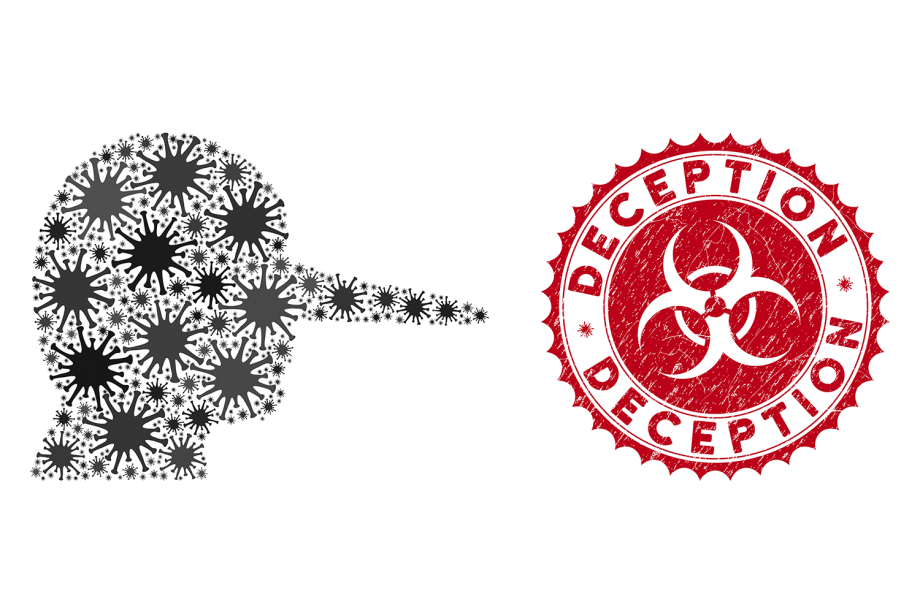A new type of virus is upon us, and it is not corona

The whole world is preoccupied with the coronavirus pandemic. Every day, we experience apprehension and our thoughts focus on how we can protect ourselves, our families and countries. Yet, while nations struggle to mobilise their resources to fight this unparalleled epidemic, another virus is spreading almost undetected.
This virus, however, cannot be stopped by social isolation, face masks and disinfection. This virus, unlike COVID-19, is man-made and is being deliberately used against our societies. It is attacking our cognitive skills. The infection symptoms include trust in the wildest conspiracy theories and sharing of poorly resourced articles or outright lies. It thrives on Facebook, Twitter, YouTube and a host of “alternative” news websites.
When the Chinese MFA spokesperson claimed that COVID-19 was imported to Wuhan by a group of US military personnel attending sport competition in October 2019, it resembled Russian attempts to cover up their involvement in the shooting of MH17 plane over separatist-controlled eastern Ukraine.
Muddy the waters, and you’ll drive attention away from your own missteps. Mainstream media in Europe, preoccupied with the fast-evolving pandemic, did not pay much attention. Yet, Russian efforts to use the Corona epidemic to weaken EU from within and sow confusion and despair, are much deeply rooted and extensive.
Since January, the EU body for monitoring disinformation has documented more than 100 disinformation cases concerning the coronavirus that have originated in Russia. Russian state funded agencies such as Sputnik, RT, RIA Novosti or Russian Army Zvezda TV are among the prominent sources asserting the coronavirus to be a US biological weapon against China or that it was designed to attack only Asiatic people.
Aside from these allegations a more sinister narrative is being planted at the same time.
Democracy has failed us, the EU did nothing and therefore we should follow the model of China or Russia and sacrifice our freedoms and open societies. While attacks of this kind are not new and similar tactics were used in the last years’ EP elections, the emergency measures and slow reaction of some European governments make them much more powerful.
It seems that China is indeed playing by the Russian playbook and is skillfully trying to cover up its own mistakes in the epidemic. While the virus was first detected in November 2019 in the city of Wuhan, it was suppressed for weeks and no serious quarantine measures were adopted until January.
When China asked for assistance, many countries responded by sending masks and other medical equipment to help in its fight against the epidemic. Now, when the situation has changed, and it is China who can offer its assistance, it does so by using this opportunity to trumpet its socio-economic model.
Democracy is not perfect and the response of many governments in Europe was indeed slow and state representatives underestimated the severity of the situation. Yet, there is no reason to abandon the core values our societies are based upon – fundamental human rights and freedoms, rule of law or division of power. Some countries in Europe are already sliding towards curbing these fundamental democratic values in the name of containing the coronavirus.
While we are struggling with the medical emergency and the economic fallout from the coronavirus, it is imperative to find new ways of protecting our societies from hostile, state sponsored influence operations. Extraordinary times require extraordinary measures.
First, we must increase our collective cognitive immunity and act forcefully to identify and stop efforts that drive wedges and fragment our societies by spreading lies, hoaxes and manipulation.
We are in a war of narratives and if we are to win, we must increase our defence capacities. The EU should significantly increase the funding and staffing of the EEAS East Stratcom team and provide assistance to its member states in developing modern, agile and effective Stratcom units.
Second, the voluntary measures social media companies have put in place to diminish or stop such malign subversive operations are neither satisfactory nor effective. As the discussion on the regulation of social media is ongoing in Brussels, it is imperative to apply lessons learnt from the current unchecked spreading of manipulative and panic creating content.
Third, there are many examples of successful campaigns, capacity building activities and other resilience increasing measures across Europe. Yet, their impact is often limited by the resources available.
The EU and its member states should significantly increase the funding for initiatives and measures defending its cognitive security from hostile attacks.
Last but not least, if we are to withstand this info-virus epidemic we have to face the truth – we are under attack. Our values and way of life are under attack by hostile powers. Unless we change our half-hearted approach, we will lose. It is still not too late, but the clock is ticking.
This article was originally published on the EURACTIV website on 25 March 2020.

Former Senior Advisor, Democracy & Resilience